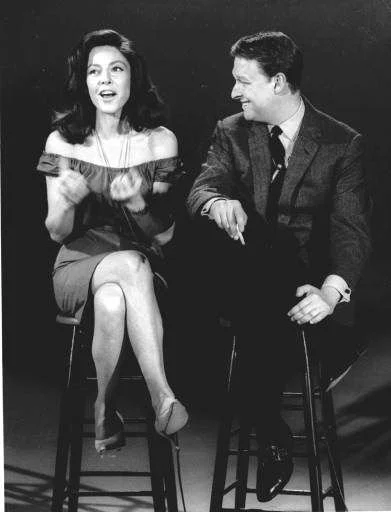NICHOLS AND MAY -- COMEDY'S PERFECT PAIR
UNIVERSITY OF CHICAGO — She was known all over campus -- beautiful, dangerous, rude. He was said to be "cold," "insufferable," with "an edge about him that put people off." So on that afternoon in 1954, when he sat beside her in a waiting room, they had really been waiting for each other. Skipping introductions, they slipped into a skit, with accents.
HIM: May I sit down, pliss?
HER: If you veesh.
HIM: Do you haff a light?
HER: Yes, zertainly.
Having fooled onlookers, they introduced themselves. The names were unknown outside the University of Chicago but once onstage, they were famous within weeks. Because there have been many male-female comedy teams, but there has never been a more perfect union of mind and wit than Mike Nichols and Elaine May.
“You can't get any better than they were," Dick Cavett remembered. "They were one of the comic meteors in the sky.”
Together just four years (and lovers for just three days), Nichols and May updated Borscht Belt humor and sent American comedy slicing through the Sixties. They did no jokes, told no stories. All they did was, with uncanny and uncomfortable accuracy, show us US.
Nichols played: the smug teenager, the pompous intellectual, the drab bureaucrat. May did not play anyone. She simply became: the nagging mother, the icy telephone operator, the giggling actress, the snob, the seductress, the neurotic. . .
Though they seemed twins separated at birth, their backgrounds were as contrasting as their futures. Nichols, born in Hitler's Germany, came to America at age seven speaking no English. Awkward but intelligent, he stumbled through prep schools and into the University of Chicago where he rarely went to class.
Meanwhile, May toured America as a child actress in the Yiddish theater. Settled in LA, she dropped out of high school, married at 16, had a daughter, divorced. By the time they met, each had read widely, studied acting briefly, and soaked up all the pretensions of post-war America.
Their timing was as perfect offstage as on. A new comedy -- sharp, daring, improvised -- was brewing in Chicago. At the Compass Theater, Nichols and May joined Ed Asner, Barbara Harris, and others. Taking suggestions from the audience, they took off.
“Somehow we could talk in shorthand," Nichols remembered. "If one of us said, or someone in the audience said, ‘Two teenagers in the backseat of a car,’ we had the scene. We didn’t have to know more than that sentence."
Then there was the time Nichols' mother called: "'Hello, Michael, this is your mother – do you remember me? And I said, ‘Mother, let me call you right back,' and I called Elaine and I said ‘I’ve got a really good piece for us tonight.'”
In 1957, they left the Compass Theater to study acting in New York. Meeting a potential agent at the Russian Tea Room, they broke into skits. “Their work was so startling, so new, as fresh as it could be," Jack Rollins remembered. Stunned “by how really good they were,” he booked them to open for another comic. Soon they were headlining, then on TV, hailed by critics as "the hipsters' hipsters." Reading the reviews, Nichols called May at 4 a.m. and asked, “What do we do now?”
What they did is still talked about. How they broke up the Emmy Awards by... well, just watch.
And how they spoofed Tennessee Williams, Dostoevsky, Pirandello. How they became co-workers at the office, doctors and nurses in the operating room, couples in a confused and changing America. They could even make a refrigerator funny.
Then as quickly as it started, it ended. Broadway was the gig that broke them. Doing the same bits in 300+ sold-out performances, they retained their edge but lost their interest. In July 1961, they closed the show and their act. He wanted to direct, and did -- "Who's Afraid of Virginia Woolf?" "The Graduate." "Carnal Knowledge." "Angels in America." She could have been one of the great comediennes of modern times but she turned down role after role. She wanted to write.
Elaine May was always "about fifty percent more brilliant than she needs to be," a Compass veteran remembered. She wrote forgotten plays but a few remembered movies, including "Heaven Can Wait" and "Primary Colors." Her directing career collapsed, however, with "Ishtar," a monumental flop. “If all of the people who hate 'Ishtar' had seen it," she often says, "I would be a rich woman today.” But she and Nichols did not collaborate again until 1996 on "The Birdcage," her re-write of La Cage aux Folles.
Mike Nichols died in 2014. Elaine May, a notorious recluse, is rarely seen. They live on, however, in the comics they inspired. "I used to go to sleep to them at night" Steve Martin said. "They were like music."
And so, an encore...








